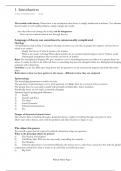Lecture notes
Political Theory module. University of Bath year 2. PL20970
- Institution
- University Of Bath (UoB)
Full in depth notes for Political Theory module for University of Bath 2nd year students. All units and lectures are covered for exam and essay preparation.
[Show more]



